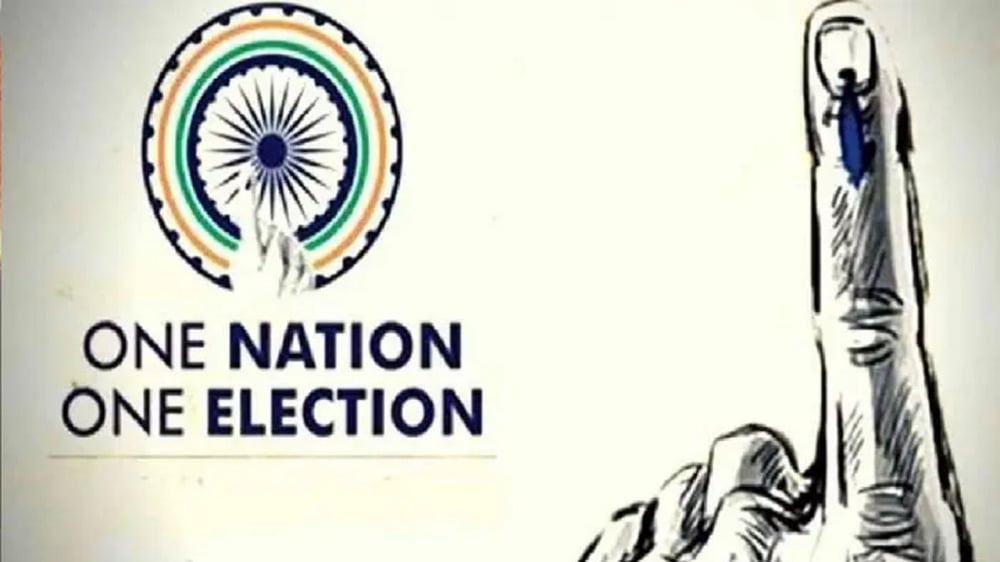
The Modi government has taken a big step towards 'one nation, one election'. The Modi government has given cabinet approval to the report of the committee headed by former President Ram Nath Kovind. It is believed that the 'one nation, one election' bill can be introduced during the winter session of Parliament. In the current situation, many important steps will have to be taken to make 'one nation, one election' a reality. It can be implemented only by passing it in Parliament and amending the Constitution with the cooperation of the states.
Challenges to passing a constitutional amendment
The Modi government has approved the Cabinet report on One Nation, One Election to hold simultaneous Lok Sabha and Assembly elections in the country. Now the challenge is to pass the necessary constitutional amendments to make it a reality. The Modi government has argued that when the Jammu and Kashmir Reorganization Bill, Citizenship Amendment Bill (CAA) and GST were passed by Parliament, the ruling coalition did not have a majority in the Rajya Sabha. Now the NDA has a majority in both the Rajya Sabha and the Lok Sabha, but the question is whether it will be implemented so easily?
one nation one election
To implement one nation, one election, the Constitution will have to be amended. This will require the support of opposition parties. In the third term of the Modi government, the BJP did not have a majority alone but formed the government with NDA allies. Earlier, the Modi government was in power on its own during its first and second term, making the decision to implement GST or remove Article 370 from Jammu and Kashmir much easier.
Consent of the states is also necessary
The issue of Article 370 was related to the country, which no party could oppose even if it wanted to. Only the regional parties of Kashmir were against it. Similarly, the issue of GST was also related to economic policies and Congress already wanted to implement it. That is why the Modi government has passed it easily, but the issue of One Nation, One Election is related to political parties and states. For one nation, one election, amendment is also needed in the Constitution, in which the consent of the states is also necessary.
Modi government does not have numbers game in the party
The NDA may have a majority in the Lok Sabha and Rajya Sabha, but passing One Nation, One Election is not a numbers game. The BJP-led NDA has the support of 293 MPs in the 543-member Lok Sabha and 119 MPs in the 245-member Rajya Sabha. This alone will not work in Parliament, for any constitutional amendment to pass, the proposal must have the support of a simple majority of two-thirds of the members present and voting in the Lok Sabha.
Constitutional amendment process
A country has to adopt a constitutional reform process for one election. For this, if all 543 members of the Lok Sabha are present on the day of voting, then the Modi government will need the support of 362 members to pass the bill. The opposition alliance has 234 members in the Lok Sabha, the NDA has 115 members in the Rajya Sabha and the support of six nominated members, while the opposition alliance has 85 members. In such a situation, if all the members of the Rajya Sabha are present on the day of voting, then the support of two-thirds i.e. 164 members will be needed. The 15 parties opposing One Nation, One Election have a total of 205 members in the Parliament. All opposition forces including Congress, SP, RJD, Shiv Sena are against it, due to which it is not easy to implement it.
How to get approval from states
For One Nation, One Election, the Modi government will also have to take approval from the states. Constitutional amendments will require approval from the state legislatures. The Modi government may definitely get the support of BJP-ruled states on this issue, but the state governments of opposition parties will not agree with this. Parties like TMC, Congress and Left are in the opposition. It is not easy to make reforms in the legislatures where these parties are in power. Many states have expressed their opposition to CAA and NRC by passing resolutions in their respective assemblies. Therefore, getting approval from the states does not seem easy.
How to convince a regional party?
In India, Lok Sabha and Assembly elections are fought on different issues. In such a situation, if Lok Sabha and Assembly elections are held together, the voting pattern will change and the local and especially regional parties will have to bear the brunt of it. There are many small parties in India, which fight elections on regional issues. In such a situation, One Nation, One Election poses a threat to the existence of small parties, while national parties will benefit. In such a situation, many small parties are openly opposing it.
Building a consensus is not easy
Union Minister Ashwini Vaishnav said that the Jammu and Kashmir Reorganization Bill and the Citizenship Amendment Bill were passed by Parliament, but the ruling coalition did not have a majority in the Rajya Sabha. He said, we will try to build a consensus in the next few months. Our government believes in democracy and building consensus on issues that affect the country in the long run. The government will hold discussions across the country and our government believes in consensus among many groups. There will be high-level discussions. Rajnath Singh, Kiren Rijiju and Arjun Ram Meghwal have been assigned the task of building a consensus by talking to all the parties, but it is not easy.
 look news india
look news india